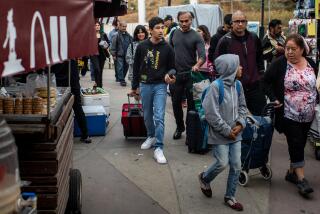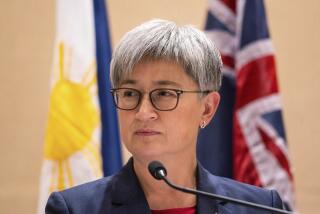Asylum-Seeking Family Reunited, Behind Bars
- Share via
JAKARTA, Indonesia — Asylum seeker Ali Asqar Bakhtiari, whose wife and five children were locked up for two years in Australia while he was allowed to live there freely, was reunited with his family Saturday -- but not the way he wanted.
Bakhtiari, who was detained last month after authorities charged that he had lied about his background, was flown from Sydney to the Baxter detention center in South Australia state, where his wife and children are being held. The government is seeking to deport the family.
The Bakhtiaris’ case has been an embarrassment to the government because it has highlighted the harsh and unequal treatment some asylum seekers in Australia have received. The Bakhtiaris contend that they are Afghan refugees who fled the Taliban when it ruled Afghanistan. Ali Bakhtiari, who arrived in Australia alone in 1999, was granted asylum. But when his wife, Roqia, and their children arrived on New Year’s Day 2001, officials refused to accept her story and kept them locked up. Officials said they believed Roqia and the children were from Pakistan, whose citizens are not eligible for asylum in Australia.
After the family’s separation gained international attention and was challenged in the courts, immigration officials charged that Ali Bakhtiari was a Pakistani plumber, not an Afghan farmer, and should never have been granted a visa. Last month, authorities revoked his asylum status and picked him up in Sydney, where he had been living. Ali Bakhtiari has continued to maintain that he and his family are from Afghanistan.
“There’s been so much publicity, and they want to make an example of him,” said Nicholas Poynder, one of the attorneys assisting the family.
Australia took a tough stance against asylum seekers in 2001 after thousands of people fleeing conflicts in Islamic countries began arriving on leaky, overcrowded boats from Indonesia. The Australian navy established a blockade to prevent the boat people from reaching land and shipped more than 1,000 asylum seekers captured at sea to remote Pacific islands. All asylum seekers who arrived in Australia without authorization were locked up while their applications were processed. Some, including children, have been incarcerated for more than two years.
The hard-nosed policy, which helped the government of Prime Minister John Howard win reelection in 2001, has worked: There have been no illegal boat arrivals in the last 18 months. But some Australians and international human rights officials have criticized the approach as too harsh.
Steve Ingram, a spokesman for the immigration department, said that about 500 asylum seekers remain in custody and that nearly all their applications have been rejected. Three-quarters have exhausted their appeals but cannot be deported because their own countries will not accept them.
Since Roqia Bakhtiari and the children arrived in Australia, they have spent most of their time at the Woomera detention center, a camp in the outback of central Australia notorious for its austere conditions. For many months, Ali Bakhtiari was unaware that his family was in Australia. After the family’s plight became known, sympathetic Australians donated money so he could travel to Woomera and visit his wife and children.
Last month, a wave of protests swept the country’s seven detention centers, and 40 buildings were burned at Woomera. Afterward, the family was transferred to the recently opened Baxter camp.
Ingram said Bakhtiari was flown to Baxter on a commercial plane Saturday. No details of the family reunion were available.
Legal challenges filed on behalf of the Bakhtiaris could set important precedents for asylum seekers in Australia. One suit challenges a law denying asylum seekers the right to file appeals in court. Another challenges the government’s ability to deny children entry visas when one of their parents has been granted asylum.
More to Read
Sign up for Essential California
The most important California stories and recommendations in your inbox every morning.
You may occasionally receive promotional content from the Los Angeles Times.













